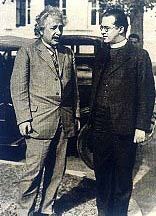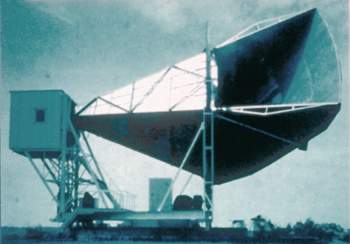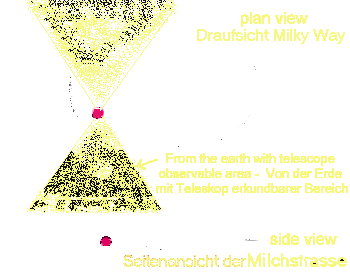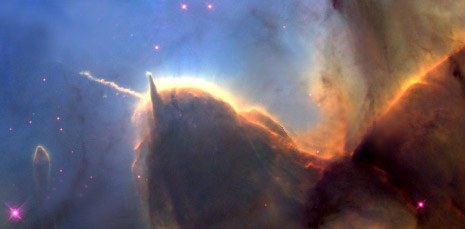|
Introduction
on astronomy 1b
Space
curvature
The
relativity theory of Einstein is as follows:
The
gravitation or attraction is not an energy like others, but it is the result
of a
circumstance,
that space-time is not even, but curved.
As
a result, the shortest ways through straight line are not the best possible
ways, but the bodies are moved to the curved red way (see drawing: Geodaet
). They follow the optimum course in a therefore curved space caused
by gravitation. They follow the red way, the Geodaete. This is the best
way in a curved space, where very less energy is required. The earth and
the light beam in the above two diagrams
show the best approximation in a straight line, which is possible in a
curved space.
According
to the general relativity theory, a body allways follows straight lines
in a
four-dimensional
space-time (length, width, height and time). But for us as observer, it
appears to move in the form of an ellipse or other curved lines and
not in straight lines.
Now
we just imagine to view a bird or an airplane, flying over a landscape
with mountains, valleys and channels. The airplane or the bird flies in
a practically straight line over the country. But the shadow of the flying
object on the two-dimensional earth's surface does not appear to move in
a straight line. The shadow is once deep on the mountain, then on the valley
and then even deep in the channel. It is a very much curved locomotion
line, but the airplane flies straightforward.
It
is clear that it is not simple for a gentle reader to imagine a space curved
by attraction so easily. It is the same difficulty with the relatively
passed time, when two persons move forward with different speed.
(see
Einstein's twin paradoxon ( twin paradoxon
)).
Now
we start with a theoretical attempt:
We
start with a spaceship and fly always straightforward. Through the curvature
of the space, we can reach-back again our starting point. We have then
crossed the entire universe along the Geodaete space.
Time
curvature
Just
like the space, the time also changes through the attraction of the mass.
Space and time are one or respectively form a unit (Look).
The time is stretched at perigee. The closer we are to planets, the slower
the time passes. We now build a tower on the earth's surface and attach
an atomic clock at every 50 meters in the height. Atomic clocks are
the most exact timing instrument. Thus we found out that the clock at the
foot of the tower ran slower at most compared to all other clocks.
There
is a time difference and this clock compared to all others have a delay.
This
is the statement of the third clock:
The
time passed compared to the two clocks attached further down is larger.
The time passed in relation to those clocks attached further above is smaller.
This means- the further above, the faster the time passes.
OR:
The further away is the clock from the mass, the faster the time passes.
Naturally the difference of the time are measured in millions of
seconds at our clock tower.
This
has a bigger effect on a flight in the universe. Besides, the speed of
the aircraft also have an influence on this. (see Einstein's twin
paradoxon )
Gravitation
Our
solar system lay a distance of 28000 light-years from the center of the
galaxy and circles it at 250 km/hour. The complete circulation needs 200
million of years. At first in 1924, Georges Lemaitre had the idea,
that a Big Bang has been occured, which was developed from a Ur-atom with
extraordinary density.
Georges
Lemaitre

Left:
Einstein and (right) Lemaitre
Lemaitre was the first person,
who had have the Idea of a big bang.
The
foundation, that it might have been a Big Bang, was discovered by astronom
HUBBLE. He also suggested, that all galaxies move away from the earth.
However,
this does not mean, that the earth is found in the center of the universe.
Thus the galaxies move away from every planets of the universe. Albert
Einstein did not believed in the Big Bang theory. He knew Lemaitre personally.
(magazine "star" - report 7.1.2002)
The
background radiation - project: Boom rank
The
astrophysicists of Adam and Laughlin performed the project : Boom rank
in the year 1964. They let measuring balloons rose into the stratosphere
in the ice desert of the antarctic and the texanic desert.

Penzias and Wilson
discovered
the cosmic background
radiation with this antenna.
The
cosmic background radiation was ought to be found, which was developed
by the Big Bang. They mean that they found therein, tiny variations in
temperature and ripples.
Thus
they made their conclusion: The expansion of the universe lasts infinite
-
no
collaps will occur (reversal of the expansion - thus a collapse of the
universe). The stars glow in the distant future and then the universe die.
Telescopes
- space telescopes
The
space telescope outside the terrestrial atmosphere can even record incoming
weak light beams of the stars without being affected by dust, water vapour
and air flows.
Official
page of the Hubble space telescope: http://www.stsci.edu/http://ngst.gsfc.nasa.gov/
"
NEXT
generation space Telescope "successor of Hubble space telescope: http://hubble.stsci.edu/gallery/showcase/text.shtml
With
naked eye
The
first astronomer, who used the simplest telescopes to view in the year
1650, is Galileo Galilei. Before this, Dane
Tycho Brahe viewed the exact planet positioning
only with the naked eye. However as an aid, Dane
Tycho Brahe constructed some of his own observing devices around 1576 -
1610.
Seeingof
humans 1 - Part 2
- see article
Telescope
area

The
yellow marked telescope areas of the terrestrial astronomers
Only
the yellow speckled area can be searched by the telescopes. The star dust
in the spiral arms hides the observations in the level of the galaxy. Only
the two lateral areas can be observed. Our star, the sun (and thus the
planet system) is found to be in an outside spiral arm, about 30,000
light-years far away from the center (see figure above). The small red
point in the figure shows the position of our solar system
The
4 fundamental forces
There
are 4 fundamental forces in our universe.
The
force of gravitation is the first, which holds all planets in its orbits.
Even when the range of the gravitation is far away within reach, if one
considers , all comets are fixed to it. The Halley's comet visits us every
76 years and its course is determined by the gravitation.
The
second fundamental force is the electromagnetic force, which is 1000000000000000000000000000000000000000
times stronger , but shorter in the range. Electromagnetic forces are responsible
for the atomic characteristics and control the laws of chemistry (inclusive
DNA molecule). The muscle power, and the explosion power of dynamite up
to the flapping wings of birds are influenced by the electromagnetic force.
The
third and fourth fundamental force are the atomic nucleus forces,
which are stronger than the electromagnetic forces, however is the range
of the strength substantially shorter. --> ATOM
glossary A .
The
forces hold the atom together.
The
4 fundamental forces and the Big Bang
NR.
2. NR. 3 and NR. 4 of the fundamental forces are described in the quantum
theory. The NR. 1 of the fundamental forces is described in the relativity
theory. To specify the Big Bang scientifically, the quantum theory
of the gravitation is missing, which connects all 4 fundamental forces
in an uniform description. --> history of the cosmos - Joseph Silk - spectrum
publishing house

Globular
star cluster
Astrologie
= > (Greek star interpretation) the attempt to interpret and predict the
happening on earth and the fate of humans from certain constellations of
the stars. The Astrologie proceeds thereby from the conviction that between
the star world and terrestrial processes (in particular of the human existence),
a detectable regulated and thus prognosticatable relationship exists. The
definition is taken out of Meyers large pocket dictionary in 24 tapes 5.
Edition, Mannheim, 1995.
The
astrology and the astronomy developed at the same time. Moreover it can
be maintained, that the astronomy was followed out from the Astrology.
The astrologers had the appropriate motivation to enlarge the theme on
astronomy. No astrological interpretation can be created without planet
positions. Since now, no physical conclusive assertion are found, why planets
and stars influence the life of humans. No outgoing astrale energy was
discovered from the planets and the sun, which can have an influence on
the luck or misfortune of humansbeings. However some humans seem to behave
crazy at full moon. The moon causes low-tide and flood. But that is still
no conclusive proof for the influence of the planets on special abilities
of humans.
It
is also unclear why planet constellations and sun birth status are to interpret
high-intelligent humans. The Astrology is based on the 12 animal sphere
signs: However in the course of the time a change in the obliquity
of axes took place through precision, which modifies its direction and
describes a cone. At this, only the inclination remains equal to the ecliptic.
This causes that the spring point is found to be today in the character
of the FISH. In former times the spring point was fixed on the 21th
of March with the Aries. That means, there is a shift of the true
constellations of an animal sphere signs.
Stephen
Hawking represents a general theory to the Astrology: The Astrology has
not resisted any experimental examination. The complicated apparent movements
of the planets in the sky were explained by Newton's law and have no influence
on the personal fate. End of quotation Hawking.
Or
has been a formula being discovered at the same time with Newton Gravitation
Law for the calculation of the person fate (human signpost/guide)?
Zodiac
Zodiac
is called as the thirteen constellations, through
which
the sun moves in the course of the years. The way that defines more
exactly the way of the sun is the ecliptic. Classically the constellations
Aries, Pisces, Taurus, Gemini, Cancer, Leo, Virgo, Libra, Scorpio, Sagittarius,
Capricorn and Aquarius (from the spring equinox) belong to the animal sphere
signs. Due to the precession of the earth, the Ophiuchus is also
found to be situated meanwhile in the ecliptic, without having been
established in the horoscopes history. We do also sometimes read
Zodiakus. Last paragraph : http://www.enzyklop.info/
.
. .: * ~ *:. _.: * ~ *:. _.: * ~ *:. _.: * ~ *:. _.: * ~ *:. _.: * ~ *:.
_.: * ~ *:. _.: * ~ *:.
Author:
Robert Kinkel on 2002.4.4 after Christ
Translation
- German to English: Tara Kinkel - 2003.7.7. after Christ
|
